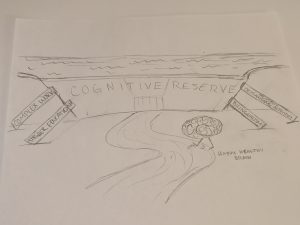
What is cognitive reserve?
The terms brain reserve and cognitive reserve are often used interchangeably, however, there is a difference between the two. They are sometimes categorized as passive and active models. Brain reserve is a passive model. It is the size of the brain and its neural components. Individuals have different capacities of brain reserve. These differences lead to differences in how different degrees of brain damage is expressed. Cognitive reserve, on the other hand, is an active model. Cognitive reserve suggests that the brain actively tries to adapt or cope with damage by utilizing pre-existing cognitive processes or by using compensatory processes. With this idea, someone who has more cognitive reserve may be able to tolerate more damage before showing any impairment than someone with less cognitive reserve, even if they have the same amount of brain reserve capacity.
Exposure to environmental enrichment can be beneficial to brain reserve. Enriching factors may include high educational level, complex work, and large amounts of mentally demanding activities. Environmental enrichment has been shown to increase neurogenesis, gliogenesis, angiogenesis, and synaptogenesis in hippocampal and neocortex regions.

Cognitive Reserve and Alzheimer’s Disease
Cognitive reserve has been shown to mediate the clinical manifestations of Alzheimer’s disease (AD). One study looked at AD patients with higher education levels and lower education levels and the differences in different abilities. They saw no difference between groups with the preservation of verbal abilities. They did notice, however, that higher education patients had better preserved visuo-spatial abilities, logical deductive reasoning, constructional praxis, and executive functions. Lower education patients had reduced grey matter volume when compared to higher education patients.
Bilingualism can also increase cognitive reserve. Studies indicate that bilinguals can compensate for more severe changes from early phases of AD than monolinguals.
Cognitive Reserve and Parkinson’s Disease
There has been a greater interest in research regarding cognitive reserve and Parkinson’s disease (PD). Again, like as in Alzheimer’s disease, studies suggest that higher levels of education as a proxy for cognitive reserve has significant associations with the performance of cognitive tests in PD.
Though bilingualism has been shown to delay clinical manifestations in AD, it has not been well studied with PD. The first study to look at this found no significant difference between monolinguals and bilinguals with PD in the performance of executive function tests.
Research between cognitive reserve and neurodegenerative diseases like AD or PD is limited. Further studies need to be conducted to come to any further conclusions on how cognitive reserve impacts brains of these patients.
References:
https://www.ncbi.nlm.nih.gov/pmc/articles/PMC2739591/
https://www.ncbi.nlm.nih.gov/pmc/articles/PMC4831977/
https://www.hindawi.com/journals/pd/2015/943572/
https://www.prd-journal.com/article/S1353-8020(13)00304-0/pdf
Image source:
https://www.health.harvard.edu/mind-and-mood/what-is-cognitive-reserve